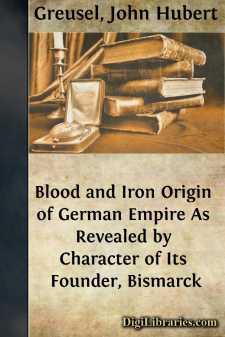Categories
- Antiques & Collectibles 13
- Architecture 36
- Art 48
- Bibles 22
- Biography & Autobiography 813
- Body, Mind & Spirit 142
- Business & Economics 28
- Children's Books 15
- Children's Fiction 12
- Computers 4
- Cooking 94
- Crafts & Hobbies 4
- Drama 346
- Education 46
- Family & Relationships 57
- Fiction 11828
- Games 19
- Gardening 17
- Health & Fitness 34
- History 1377
- House & Home 1
- Humor 147
- Juvenile Fiction 1873
- Juvenile Nonfiction 202
- Language Arts & Disciplines 88
- Law 16
- Literary Collections 686
- Literary Criticism 179
- Mathematics 13
- Medical 41
- Music 40
- Nature 179
- Non-Classifiable 1768
- Performing Arts 7
- Periodicals 1453
- Philosophy 64
- Photography 2
- Poetry 896
- Political Science 203
- Psychology 42
- Reference 154
- Religion 513
- Science 126
- Self-Help 84
- Social Science 81
- Sports & Recreation 34
- Study Aids 3
- Technology & Engineering 59
- Transportation 23
- Travel 463
- True Crime 29
Blood and Iron Origin of German Empire As Revealed by Character of Its Founder, Bismarck
Description:
Excerpt
CHAPTER I
The Man Himself
1
Hark, Hark! The giant’s ponderous hammer rings on the anvil of destiny. Enter, thou massive figure, Bismarck, and in deadly earnest take thy place before Time’s forge.
¶ It is, it must be, a large story—big with destiny! The details often bore with their monotony; they do not at all times march on; they drag, but they do indeed never halt permanently; ahead always is the great German glory.
¶ Forward march, under Prince Bismarck. He is our grim blacksmith, looming through the encircling dark, massive figure before Time’s forge.
The sparks fly, the air rings with the rain of blows: he is in deadly earnest, this half-naked, brawny Prussian giant; magnificent in his Olympian mien; his bellows cracking, his shop aglow with cheery-colored sparks as the heavy hammer falls on the unshapen ores on the big black anvil.
¶ Thus, toiling hour after hour in the heat and sweat, our Pomeranian smith with ponderous hammer beats and batters the stubborn German iron into a noble plan—for a great Nation!
¶ From a human point, we do not always see the ultimate glory.
For that is obscured by dark clouds of party strife, extending over years, the caprices of men and the interplay of ambitions both within and without the distracted German lands. Russia, Austria, Italy, Great Britain, France, Spain, have their spies engaged in all the under-play of political intrigue; there are a thousand enemies at home and abroad, in camp, court and peasant’s cottage.
¶ And at times, weary of it all, we throw down the book convinced that, in a welter of sordid ends, the cause is lost in shame.
But, somehow, some way, Germany does in truth ultimately emerge triumphant, in spite of her amazing errors and the endless plots of enemies.
She does indeed justify her manhood—and thus the Bismarck story is of imperishable glory.
¶ We say that Bismarck had to re-inspire the Germans to be a fighting nation.
What we mean is that the spirit of the ancient Teutons had to be aroused; for though it slumbered for centuries, it never died.
Rome found that out when she was still in her infancy; the Germans burnt the town by the Tiber; and the fearsome struggle between the Romans and the Germanic tribesmen lasted almost unbroken for nearly five centuries.
¶ The Romans regarded the Germans as the bravest people in the world.
The migrations of the Cimbri and Teutones, and the frightful struggles in which after superhuman endeavors the Roman Marius destroyed his German enemies is one of the heroic pages of all history. It was a hand-to-hand contest, and torrents of human blood ran that day. Menzel tells us, (Germany, p. 85), that the place of battle enriched by a deluge of blood and ultimately fertilized by heaps of the slain, became in after years the site of vineyards whose wines were eagerly sought by connoisseurs.
¶ The Cimbri were drawn up in a solid square, each side of which measured 7,000 paces. The foremost ranks were fastened together with chains, that the enemy might not readily break through....



